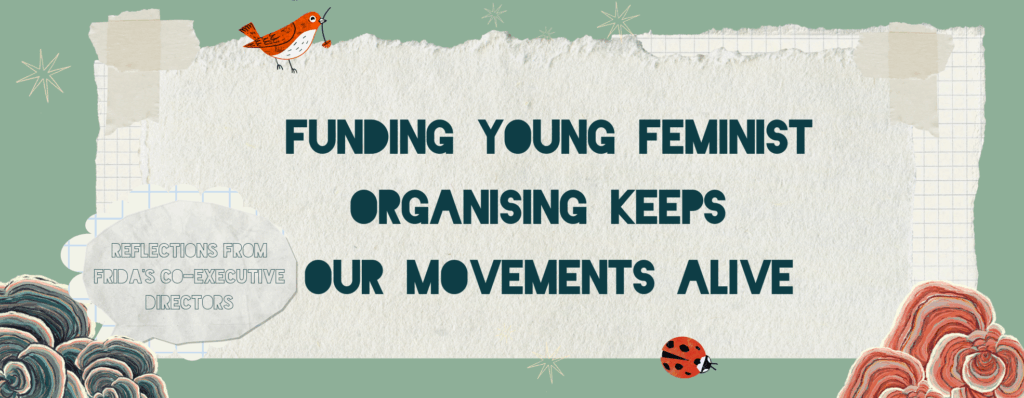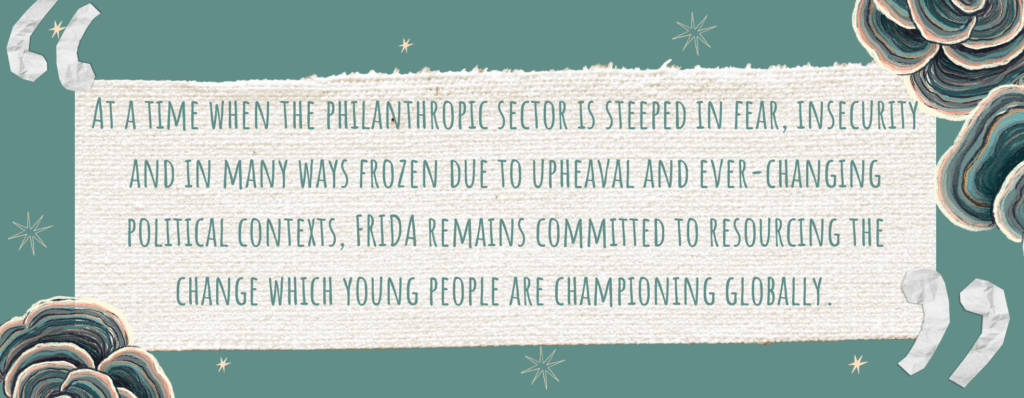
15 years of lessons, FRIDA’s co-executive directors reflect on why philanthropy must show up for youth organising.
Young people the world over have emerged as decisive actors in the fight for and in defense of social justice and human rights. Young activists have led – and continue to lead – some of the most transformative rights struggles of the past decades. From the Soweto Uprising, Anti-Apartheid and Disinvestment student movements in South Africa, to the more recent Nepalese Gen Z protests against government restrictions, corruption and political exclusion, time and time again, youth movements have demonstrated the need and urgency of youth, as an engaged as conscientious citizenry, to take a defining part in how societies are shaped, and organised fairly and justly.
Young women, girls, and gender expansive people are often found operating at the crux of youth movements, and are often found at the forefront of organising towards social justice and human rights, despite the disproportionate risk in doing so. They have repeatedly challenged and transformed political participation by circumventing traditional power structures, and introducing new, participatory, and often decentralised methods of political and civic mobilisation that rely on collective care and intersectional understandings of oppression. They innovate quickly, are apt at leveraging digital organizing, and mobilize communities in ways that more traditional actors cannot.
Too often however, their leadership is undervalued, unrecognized, and untrusted, leaving them with limited access to decision-making roles and financial resources necessary for the success of their efforts and movements. Patriarchal systems place structural, cultural, and material constraints on young feminists that shape who can organise, how they can organise, and what impact they can have.
AWID’s 2020 research, Where is the Money for Feminist Organizing, confirmed that women’s rights organizations receive less than 1% of both private foundation grants and government aid directed toward gender equality, despite their outsized role in organising against authoritarianism, harmful corporations, gender based violence, in advancing sexual and reproductive health and rights, and defending environmental and climate rights. AWID’s new report, Where is the Money, An Evidence Driven Call to Resource Feminist Organising, demonstrates that in 2023, the median annual budget for feminist and women’s rights organizations was just USD 22,000. Findings show limited growth in annual budgets in over a decade, pointing to a persistent budgetary glass ceiling that organizations are struggling to break through. The funding available and directed towards young feminist-led organisations is even more scant. The baseline reality is that youth organising is dramatically underfunded.
It was precisely in response to this chronic under-resourcing and exclusion of young feminist activists that FRIDA was created. Young feminists have been mobilizing, innovating, and taking risks across movements for decades, yet they face some of the deepest funding gaps for being too ‘informal’, too ‘young’, or too ‘political’ to fit traditional donor frameworks. FRIDA was built to challenge these dynamics by intentionally resourcing young feminist organisers with flexible, long-term, trust-based funding, by shifting power to young people as decision-makers, and by creating funding mechanisms that recognise young feminists not as beneficiaries, but as leaders shaping transformative social change.
Fifteen years later, FRIDA has not lost sight of the power, innovation and importance of youth activism. We strongly believe that young people are not only capable of transforming their communities, they are also reshaping the funding landscape itself. Their proximity to emerging movements makes them the most effective and visionary stewards of resources.
Yet, our organisational journey has not been linear. Over the years we have co-created and experimented with different approaches to grantmaking, organising and leadership, including moving from a youth-led leadership structure to an intergenerational leadership model, and eventually returning to youth-led governance. Through it all, we learned, unlearned, reflected and listened to the young feminist community. In our fifteenth year, we are proud to have made our way back to youth leadership. These experiences have reaffirmed the centrality of youth leadership and cemented our commitment to fully embodying what it means to be a genuinely youth-led fund.

What we have learned is that FRIDA is a space for vigorous energy, vivid imagery and creativity and one which pushes the boundaries, and speaks uncomfortable truths to power with the aim of challenging and disrupting harmful systems. And while the past 15 years have been rich with dreaming, innovation, disruption and co-creation, being youth led means embracing FRIDA as a living political space- a space for mistakes, accountability, and ongoing transformation. Through it all, we choose to stay rooted in and not lose sight of the brilliance and vision young people bring, and remain responsive to the ever-changing nature of youth activism.
At a time when the philanthropic sector is steeped in fear, insecurity and in many ways frozen due to upheaval and ever-changing political contexts, FRIDA remains committed to resourcing the change which young people are championing globally. We are holding the line, guided by the very same principles and values that built FRIDA, and trusting them to take us through this moment, because young feminists are not just inheriting movements, they are reinventing them. They are imagining possibilities beyond the limits of traditional organizing. And whilst their innovation and vision is often lauded, larger philanthropic institutions rarely invest in them. Resourcing young feminist movements is an essential part of sustaining the evolution, creativity, and resilience of the social justice ecosystem. The future of young feminist organizing depends on the autonomy, power, and leadership of young people, and when we fund young feminist movements we contribute directly to keeping our movements alive, and responsive to the world around us. In this spirit, FRIDA will continue to fund and play our role as an incubator for the next generation of social justice movements.
For 15 years, FRIDA has been resourcing and incubating nascent, young feminist movements in more than 100 countries across six regions. We have faced challenges and learned countless lessons – each one shaping how we grow, adapt, and show up for young feminists with care and accountability.By making a contribution, you help ensure that young feminist leaders have the resources, safety, and trust they need to organize boldly and sustainably. Join us in resourcing the next 15 years of feminist power.